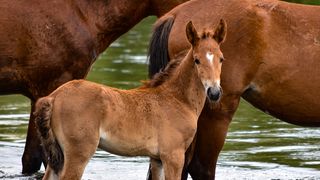The sight of a young foal being used as a “decoy” to attract customers starkly illustrates how deeply animals are instrumentalized in tourism services.
A few days ago, on a beach in Thassos, four horses involved in a tourist activity broke free from their handlers and injured a five-year-old girl playing in the sand. The incident was caught on video and it was not an isolated failure. It reveals a cascade of systemic problems, inaction, and lack of supervision that are characteristic of equine tourism operations in our country.
As shown in the footage, one of the four horses was young and unmounted. For an unknown reason it began to gallop faster, dragging the other horses into an uncontrolled run through the beachgoers. A child was hospitalized with head and body wounds as a result.
Equines Are Not Playthings
Horses, donkeys, and mules are not tourism accessories. They are sentient beings that require respect, proper training, and responsible management. Like any living creature, they can become frightened, react sharply to stimuli, become stressed by crowds—and when their needs are ignored or their nature underestimated, their reactions may become unpredictable—not out of aggression, but in self-protection.
Their presence on crowded beaches—without clear rules, proper supervision, or basic safety measures—is a danger both to people and to the animals. In the Thassos case, the horses moved among bathers with insufficient spacing, too few attendants, no safety protocols, with a totally free foal in the group—and no plan B if things spiraled out of control.
Unchecked Activity Brings Uncontrolled Risks
Tourist equine activities, especially on islands and beaches, have operated for years in a legal vacuum. There is no clear oversight mechanism for animal origin, living conditions, health status, or the training of personnel handling them.
This incident also exposes another troubling practice: using foals and young equines as “bait” for tourists. Their youth draws attention, especially from children, and increases the likelihood of a paid ride. Yet young animals lack stable behavior, are unpredictable, and can panic easily. Using them in these conditions poses a risk to the public and clearly violates principles of humane treatment.
Experts advise that equines should not be on beaches after about 7 a.m. when high temperatures and strong sunlight make the environment dangerous. Their feet can burn on hot sand, contact with seawater can cause stress, and the crowds (balls, shouting, dogs, music) elevate the risk of panic.
Current tourist-animal legislation does not adequately cover these conditions. Although minimal general protections exist for working equids, there is no specialized framework for businesses using them, covering licensing, inspections, required training, permissible hours, or operating conditions.
A Call for Immediate Institutional Action
The accident in Thassos should not be dismissed as “just another summer incident.” It is a wake‑up call. As an animal‑rights NGO, we demand that the relevant Ministries (Agricultural Development, Tourism, etc.) act immediately to:
1. Create a registry of equine tourism businesses, fully recording operations, animals, handlers, and permitted zones.
2. Mandate training and certification for all handlers—with coursework in risk management and equine behavior.
3. Require a fixed ratio of attendants per number of animals, enforced by official bodies (e.g. veterinary services, law enforcement).
4. Prohibit rides during high temperature hours or in densely touristic areas.
5. Hold perpetrators criminally responsible where negligence endangers human life or subjects animals to suffering.
Not at the Expense of Public Safety or Animal Welfare
Responsible tourism cannot come at the expense of public safety or animal welfare. Tourists—domestic and international—have the right to be sure activities offered to them are safe and ethically sound. Animals deserve environments that honor their needs and dignity.
The Thassos incident was tragic—but it can and should serve as a catalyst for meaningful change. Let us stop viewing animals as tools of tourist exploitation and recognize them as beings with rights. Let us prevent the next accident. Let us protect our children, the animals, and the integrity of Greece’s reputation as a responsible tourism destination.
